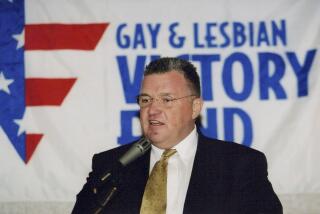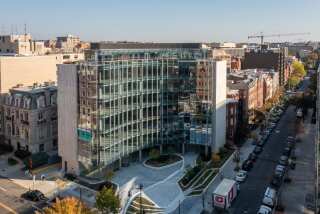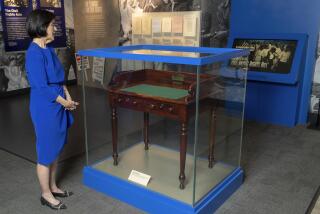Nixon Opens Policy Research Center : Politics: Think tank headquartered at presidential library will focus on contemporary world issues.
- Share via
YORBA LINDA — Former President Richard Nixon joined his onetime White House colleagues Thursday to recall the achievements of the Nixon Administration and to launch a new policy research center that they hope will continue the work they started 25 years ago.
In a garden ceremony held between the presidential library and the tiny white clapboard house where the 37th President was born, Nixon’s colleagues described him as a skillful tactician who shepherded the nation through difficult times and now holds a place as a revered statesman.
The speeches, including three by former secretaries of state and another by ex-President Gerald R. Ford, portrayed the rehabilitation of the only U.S. President to resign from office as all but complete, promising a legacy that will be shaped more by his achievements than by his role in the Watergate scandal.
The Center for Peace and Freedom, a new think tank to be headquartered at the library, will preserve Nixon’s place in history as a key player in shaping world events and add a voice to the debate over contemporary political issues, they said.
Nixon, appearing healthy and relaxed during a speech he sprinkled with humor, also reflected on the highs and lows of a public career he began in 1947.
“Was it worth it?” he said. “Politics is never going to be heaven, and sometimes it’s hell. But it was worth the trip.”
Even the presence of a small but loud group of protesters, another part of his legacy, was turned into a joke. “I hope you haven’t been distressed by some of that background noise that we’ve had here,” he said. “I remind our young people out there that I’ve been heckled by experts.”
Nixon, who celebrated his 81st birthday earlier this month, told the audience of about 1,000 invited guests that he is “not a fan of think tanks.” But he promised that the Center for Peace and Freedom would have a unique mission.
The $25-million center is scheduled to open later this year with an office in Washington. Organizers hope to move into a permanent headquarters in a new building at the library by 1997.
George L. Argyros, chairman of the fund-raising effort dubbed Legacy of Peace, said, “The center’s goal is to ensure not only that President Nixon’s legacy is remembered . . . but that his uniquely practical approach to the vast complexities of foreign and domestic policy continues to be applied in the uncertain new world we face in the wake of the Cold War.”
But details about the project remained murky, making it difficult to determine how much influence or attention the institute will command.
Nixon’s secretary of state, Henry A. Kissinger, said he would serve as an unsalaried member of the center’s board. But no other officers of the institute were announced.
At a press conference after the ceremony, Kissinger said the center will be distinct because of its focus on “middle-term problems”--as opposed to short- or long-range issues. He said that only government can respond quickly enough for short-term problems, and traditional think tanks usually address long-term political issues.
“I don’t know of another institute that does this at the moment,” he said.
Kissinger said examples of middle-term problems include the evolving relationships in Eastern Europe, the Middle East and South Africa as well as the emerging roles of Japan and China. Literature for the center said its priority “will be to have an impact on the policy-making process rather than to establish long-term niches for experts or scholars.”
The center plans to establish eight endowed chairs, six focusing on foreign affairs in the Middle East, Europe, Japan and Russia. Two others will research domestic issues.
Thursday was also the 25th anniversary of Nixon’s first inauguration as President. As a result, much of the commentary was nostalgic. At times it resembled a celebrity roast, with former Cabinet members recalling some of the most important and difficult decisions they shared in the Nixon White House.
Afterward, Nixon gave a detailed and optimistic speech about the world’s future. Forsaking the podium that the other speakers used, he talked without notes.
“Our legacy, which we have inherited from our forebears, is that we stand for something that is unique--the idea of freedom,” he said. “It is that heritage that we have that we must pass on to others. And therefore, everything that we can do . . . to make that great idea a unifying idea we must contribute to the cause of peace and freedom in the world.”
Times staff writers Lily Dizon, Matt Lait, Gebe Martinez and Rebecca Trounson contributed to this report.
More to Read
Sign up for Essential California
The most important California stories and recommendations in your inbox every morning.
You may occasionally receive promotional content from the Los Angeles Times.













